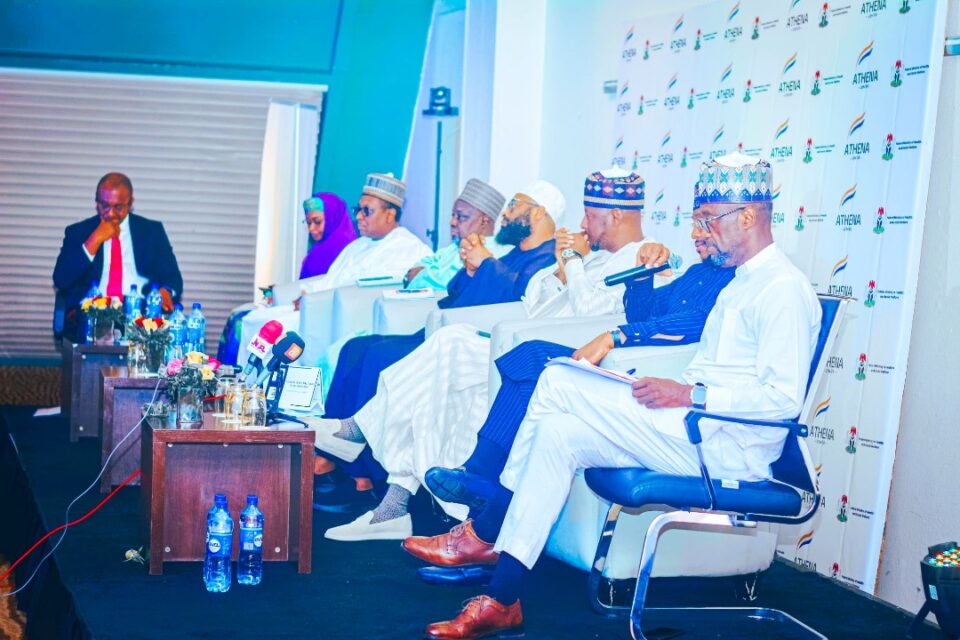By Felix Khanoba
In a significant move towards addressing malnutrition in Northern Nigeria, the Athena Centre for Policy and Leadership, in partnership with the Federal Ministry of Health, is spotlighting this growing crisis in the region.
At a policy dialogue held on Thursday in Abuja, the governors of Katsina, Kebbi, Niger, and Zamfara states committed to collaborating with the Federal Government and development partners to combat malnutrition.
Osita Chidoka, founder and Chancellor of the Athena Centre, opened the event by urging stakeholders to unite in saving the lives of young Nigerians suffering from acute malnutrition.
He highlighted the critical need for cooperative efforts to address this urgent issue.
Chidoka underscored the alarming rates of malnutrition in the region, calling for a nationwide response.
He stressed the importance of coordinated actions between federal and state governments and international partners, questioning the effectiveness of previous measures and calling for immediate and long-term solutions to end hunger in Nigeria.
“This event aims to raise national awareness about malnutrition and find tangible solutions to prevent our people from suffering from acute hunger,” Chidoka said.
On his part, Professor Muhammad Ali Pate, Coordinating Minister of Health and Social Welfare, who co-hosted the event, announced several Federal Government interventions in the area.
These include establishing treatment sites equipped with locally sourced, ready-to-use therapeutic foods in the northeast.
He also highlighted the gaps in the northwest and discussed mobilizing support to fill these gaps, including sourcing millions of micronutrient supplements.
Pate revealed that the federal government has approved $11 billion to be distributed among the states. These funds will enhance primary health care systems nationwide, improve infrastructure, equip health care centers, and provide necessary resources to treat and prevent malnutrition.
“Our children are among the most important assets of this country,” Pate emphasized, stressing the urgency of addressing the malnutrition crisis. He also announced a $60 million commitment from UNICEF’s Children Nutrition Fund to purchase therapeutic foods and other necessary supplies.
Senator Abubakar Kyari, represented by Fatima Sugra, Director of Nutrition and Food Safety in the Ministry of Agriculture, outlined key measures and ongoing efforts to address malnutrition. These include long-term food production and fortification plans, emphasizing sustainable agricultural practices.
“Despite these challenges, the federal government’s declaration of a state of emergency and collaborative efforts with state governments and various ministries aim to tackle the crisis effectively,” Sugra stated. She detailed comprehensive approaches to improve agricultural production and nutrition, including distributing improved seed varieties, promoting homestead gardening, and enhancing livestock production.
Also speaking at the event, Governor Mohammed Umaru Bago of Niger State highlighted the importance of agricultural development in combating malnutrition and hunger. He emphasized the need for improved agricultural practices to ensure the production of high-quality, nutritious food.
“My administration focuses on diversifying Niger State’s economy through enhanced agricultural production. The state’s efforts to mechanize farming make it more efficient and capable of meeting local and broader demands,” Bago noted, pointing out that Niger State has more mechanization and tractors than the rest of Nigeria combined.
In a remark, Governor Dauda Lawal of Zamfara called for renewed focus on the Northwest and North Central regions, urging development partners to avoid regional biases. Governor Umar Dikko Radda of Katsina pledged counterpart funding for interventions in his state, while Kebbi State Governor Nasir Idris, represented by his deputy Umar Abubakar Tafida, reiterated the state’s readiness to assist malnourished citizens.
Dr. Simba Tirima, Country Director of Médecins Sans Frontières (MSF), presented alarming data showing that approximately 2.6 million children in Nigeria suffer from severe acute malnutrition, with another 9 million moderately malnourished. Ritgak Tilley-Gyado, the World Bank Lead for Accelerating Nutrition Results in Nigeria, proposed actions to improve governance and coordination, create social protection programs, and deploy cross-sectoral nutrition innovations for health and healthy diets.
In his closing remarks, Osita Chidoka expressed gratitude to all participants and announced the development of a working paper to aid in creating a coherent national policy and sustainable funding mechanisms. “This working paper will address the immediate medical issues of malnutrition and the long-term need for national food security through increased food production and fortification,” he said, noting that the conclusions of this dialogue will be forwarded to Vice President Sen Kashim Shettima, Chairman of the National Council on Nutrition.
The AUTHORITY reports that The Athena Centre for Policy and Leadership is a non-profit, non-partisan research institute focused on bridging the gap between theory and practice in public policy and leadership.



